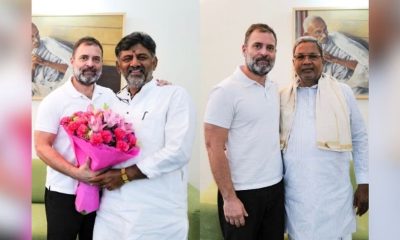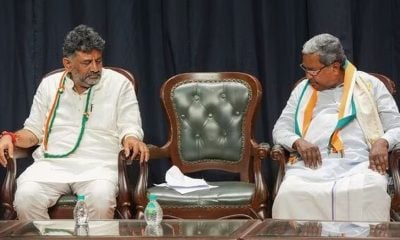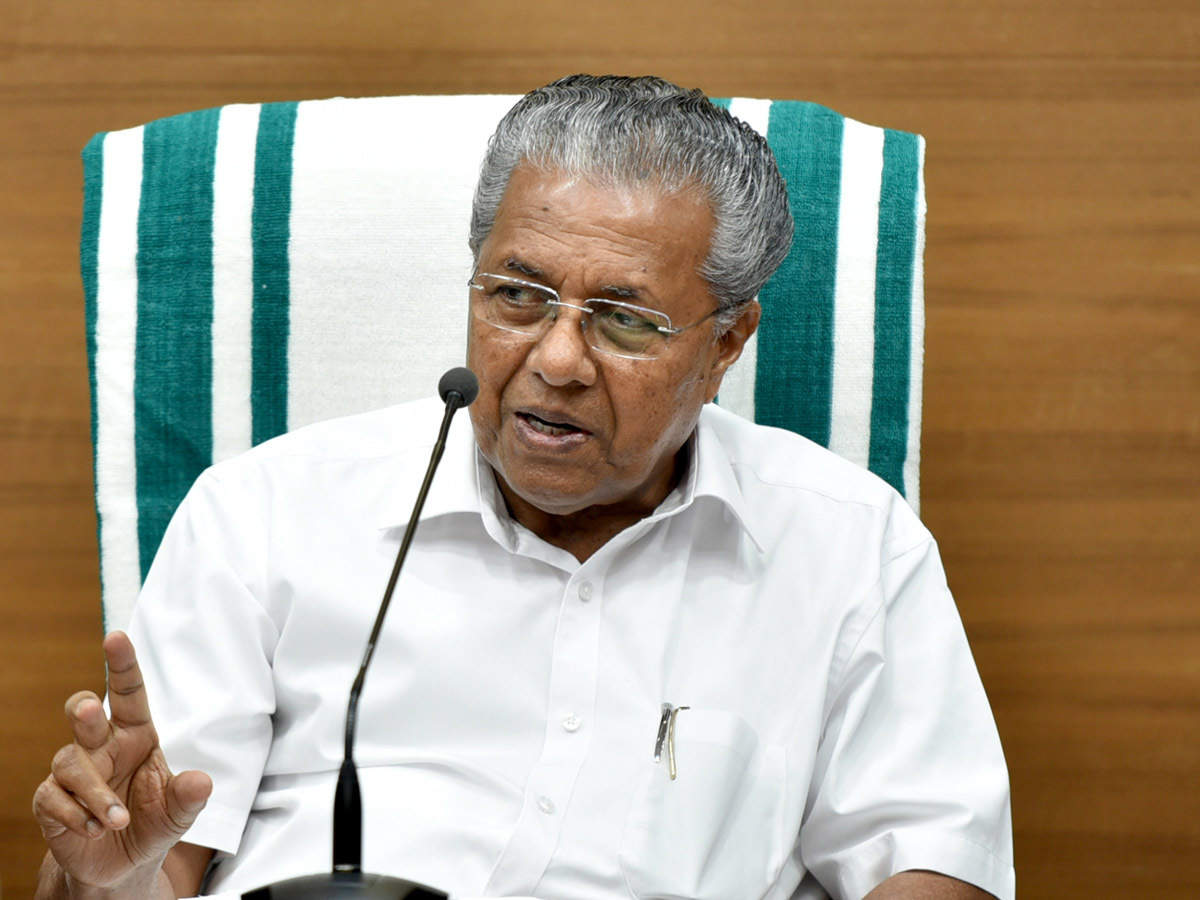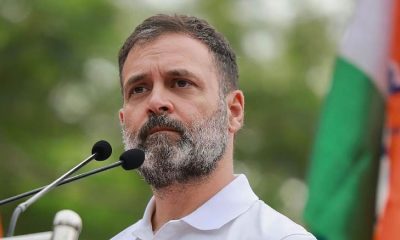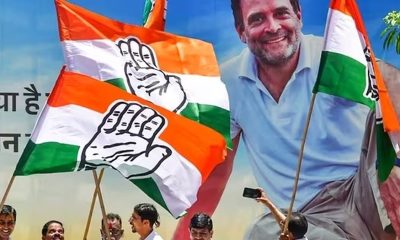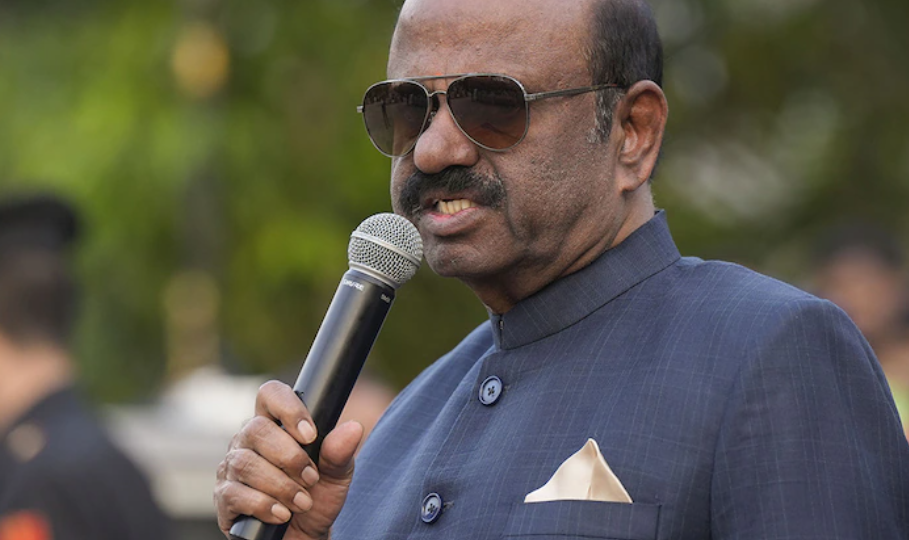As the BJP emerged as the single largest party by a wide margin in Karnataka but fell slightly short of 113 seats required for a simple majority, the Congress moved quickly to offer unconditional support to Janata Dal (Secular) to prevent the saffron party from forming a government in the southern state.
The JD(S) led by HD Kumaraswamy and Congress wrote to the Governor to stake claim to form government. Later, the BJP also approached the Governor and staked its claim.
Counting was in its final stages for 222 of 224 seats. Two of the seats, RR Nagar and Jayanagar, will have a repoll on May 28.
The tally, including leads, put the BJP at 104 seats, while the Congress at 78 and JD(S) at 37, together have 115. In what is an anomalous situation the Congress got the largest share of 37.9% of vote share, 1.7% than BJP’s 36.2%, but got 26 seats less. That again speaks of the poll management skills of the BJP and its president Amit Shah.
Hectic activity was on in Bengaluru. To start with, JD(S) has accepted the Congress offer, according to media reports. Not that the BJP has given up. News18 reported that BJP leader R Ashok was on his way to meet HD Deve Gowda. More lobbying and wooing was expected to take place.
All eyes are on Governor Vajubhai Vala, an old BJP hand.
While the Congress-JD(S) alliance has the numbers, it has the disadvantage of being a “post-poll alliance” and not a “pre-poll alliance”.
Technically, in the case of a “pre-poll alliance”, the governor would have been duty-bound to call the alliance partners first to prove majority.
That rule, however, was shelved in Manipur, Meghalaya and Goa where the BJP managed to enter into alliances to form government – and held on.
Going by rules, which in all likelihood would be enforced in Karnataka, the governor would call the single largest party – the BJP – for staking claim to form a government, and give it time to face a floor test and prove its majority. Only if loses the floor test can the governor give a chance to the alliance.
The intervening time between forming a government and the floor test provides the BJP to woo legislators and engineer splits or resignations while the alliance partners try to keep their lot together. It would be a no-hold barred situation.
JD(S)’s HD Kumaraswamy has sought appointment from the Governor of Karnataka. In a letter to the Governor, Kumaraswamy said: “This is to inform your good self that I have accepted the support extended by the Indian National Congress party for forming the government. In this regard, I seek your appointment today evening between 5.30 pm to 6 pm.”
BJP’s chief ministerial candidate BS Yeddyurappa said he will consult with Amit Shah and the national leadership to take the next step forward. He was reported to have approached the Governor and staked his claim.
Karnataka Chief Minister Siddaramaiah, who won Badami assembly seat, but lost in Chamundeshwari, tendered his resignation to the Governor, informing him about the Congress tie-up with Congress.
The alliance with JD(S) may help the Congress from completely losing the another state to the BJP which is already ruling 20 of India’s 29 states. The only other states with Congress are Punjab, Mizoram and Puducherry.
The Karnataka results mean a boost for the BJP for its Mission 2019.
While that is about the upper strata. what the results show about the politics on the ground was the effectiveness of BJP, especially its star campaigner Prime Minister Narendra Modi’s communication skill and the power of the ‘issues’ raised by the party.
The Congress failed to exploit dissatisfaction of the unemployed, the rising fuel prices and the farmers’ distress and any of the other failures attributed to the Modi government at the Centre. At the same time, it could not dispel whatever anti-incumbency there was against its own government in the state – though it still managed a higher vote share.
The ploy of wooing Lingayats by recommending that they be given minority status, a long-standing demand of the community – also failed to pay dividends as the Lingayats went with the BJP. Here, bringing in Yeddyurappa seems to have been decisive factor in favour of BJP.
This is evident from the results in last two elections. BJP lost to Congress in 2013 assembly polls when it had dumped Yeddyurappa over corruption charges. It then brought back Yeddyurappa and, in 2014 Lok Sabha, BJP won 17 of the 28 Lok Sabha seats.
The charge of corruption, then, did not seem to have put the people off BJP as they ignored the taint on him as well as the Reddy brothers of mining scam infamy to bring them back convincingly.
Prime Minister Modi campaigned exhaustively in Karnataka in the final leg of the election to ensure his party reclaimed the southern state. His rallies, initially slated to number around 15, were scaled up to 27 later. In each of these rallies, Modi had speeches tailored to the region, paying deference to local cultural icons, and speaking of the party’s commitment to addressing local needs.
The jibes of the BJP and the PM against Congress leaders, especially Rahul Gandhi and Sonia Gandhi do not seem to have been deemed unpalatable by the people.
On corruption, Modi helped get BJP out of its defensiveness due to Yeddyurappa and the Reddy brothers. Considered clean himself, Modi made it a point to say he was fighting against black money and the corrupt; that those who had looted the poor would have to return money; and that moves such as demonetisation were geared towards this end and that is why the Congress opposed it.
He went on the offensive against Congress itself, telling people at a rally in Hubli that Sonia and Rahul Gandhi were out on bail in the National Herald case. He also kept up attacks on Siddarammiah and Congress’s culture of ‘deals’ and alleging it sold tickets.
While Karnataka’s record on social indices wasn’t bad and Siddaramaiah’s selling point was the welfare schemes he had initiated, Modi projected vigorously his own record on welfare and pro-poor initiatives: gas connections, electrifying rural India, toilet construction, health benefits, housing for the poor, opening bank accounts, etc.
The biggest, it would seem, was the Hindu card. The BJP sought to portray the Congress as anti Hindu and pro-minorities. Modi repeatedly alleged that under the Congress government, BJP workers were killed with no action against perpetrators. He pointed out that the Congress was out to divide Hindus and ‘make brother fight brother’, in a reference to the move to grant Lingayats separate a religious status. This ploy seems to have worked here just as it did in some states in the north.
As for the Congress, led by Rahul Gandhi, the party failed to exploit dissatisfaction over a lack of jobs for young people and rising fuel prices along with farmer unrest.
Siddaramaiah was noted for a coalition “AHINDA”, which wove together minorities including Muslims, backward castes and Dalits. However, Scheduled Castes and Tribes (SC/STs), who decide as many as 62 of 224 seats, have broken with the Congress to go to the JDS, in part due to its alliance with Mayawati, a Dalit icon.
The Congress’ hopes belied, it may draw some solace from the fact that in a three-and-a-half-decade trend in Karnataka’s politics, the governments have consistently been voted out.
A last word about the voting percentages. While the Congress tally was way below BJP, it still managed to improve its vote share from 36.6% by 1.3% to 37.9%. The BJP’s increase was larger. In 2013, it polled 19.8% and, adding the votes polled by the Yeddyurappa and Sriramulu factions which are now with the BJP, its vote share five years ago was 32.4%. In the latest election, the Modi-Shah-Yeddyurappa trio have managed to boost that by 3.8% to touch 36.2%
The JD(S) has seen a decline in vote share from 20.2% to 18.4%.


 Latest world news14 hours ago
Latest world news14 hours ago
 Latest world news13 hours ago
Latest world news13 hours ago
 Latest world news7 hours ago
Latest world news7 hours ago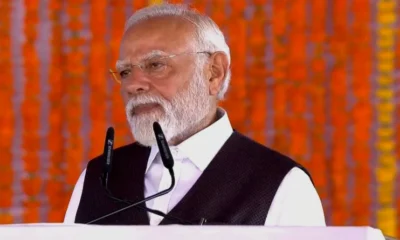
 Latest world news5 hours ago
Latest world news5 hours ago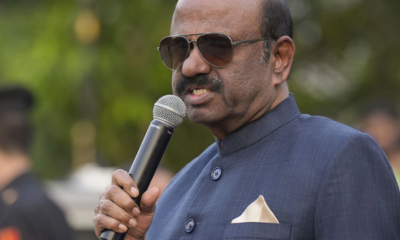
 India News4 hours ago
India News4 hours ago
